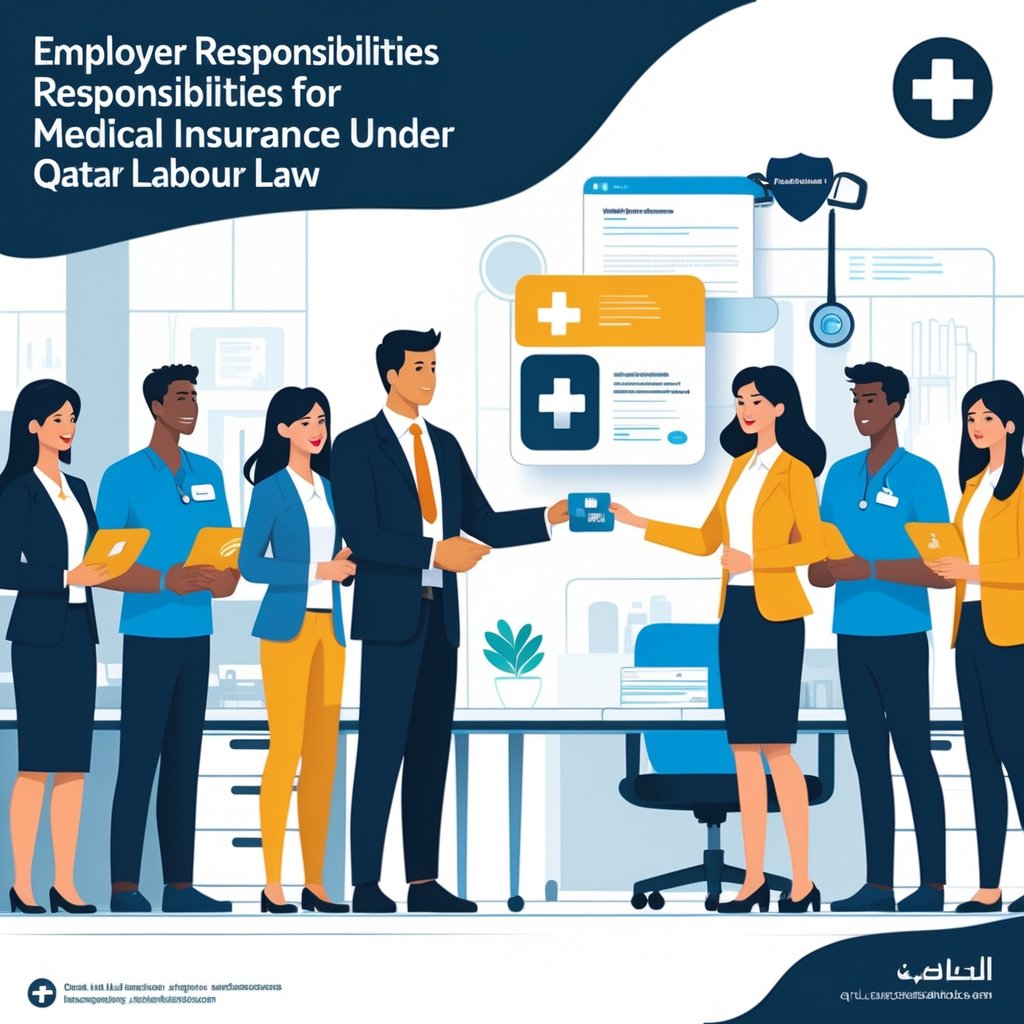Qatar recently shook up its healthcare system, and the changes hit every employer and employee. The Qatar Labour Law now requires all employers to provide mandatory health insurance for their non-Qatari employees and eligible family members.
This law kicked in during May 2022, replacing the old healthcare approach.

If you live or work in Qatar, or you employ people there, you have to get familiar with these rules. The mandatory health insurance system applies to all expatriates and visitors in Qatar.
Employers have to use approved Qatari insurance companies and cover the basics.
These changes affect how you see a doctor, what your employer pays, and what paperwork you need. Knowing your rights under this system helps you get the care you need and stay inside the law.
Key Takeaways
- All employers in Qatar must provide mandatory health insurance for non-Qatari employees and their eligible family members through approved local insurers
- You need valid health insurance to access basic medical services in Qatar as a non-Qatari resident or visitor
- Employers pay the insurance premiums and must keep coverage matching the length of your stay
Mandatory Medical Insurance Under Qatar Labour Law

Qatar’s system now makes employers provide medical coverage for workers and their families. The law covers all non-Qatari nationals working in Qatar and spells out what both employers and employees have to do.
Scope of Mandatory Coverage
The mandatory health insurance law covers all non-Qatari nationals working and living in Qatar. You have to make sure coverage includes sponsored employees and their families.
Coverage Requirements:
- All expatriate workers, no matter their pay
- Employee family members on the sponsor’s visa
- Basic medical services like emergencies and accidents
- Coverage that lasts as long as the residence permit
Your employees can’t renew their residence permits without valid health insurance. That makes compliance non-negotiable.
Qatari nationals get free public healthcare, so they’re not included. Still, you might decide to offer private coverage for Qatari staff as a perk.
Visitors need medical insurance too, with a max monthly premium of QAR 50. This applies to business travelers and short-term workers your company brings in.
Legislative Framework Overview
Law number 22 of 2021 regulates health services in Qatar and sets up the mandatory insurance system. The law came out in the official gazette on October 18, 2021.
The Healthcare Services Law started partially in May 2022. Implementation happened in two phases so businesses could catch up.
Implementation Timeline:
- Phase 1 (May 2022): Visitor insurance requirements
- Phase 2 (Ongoing): Full resident coverage system
The 2024 amendments added new requirements for employer registration with authorities. You now need to register workers with the General Retirement and Social Insurance Authority (GRSIA).
The Ministry of Public Health oversees everything and works with registered insurance companies. You can only buy coverage from approved providers.
Impact on Employers and Employees
Your Employer Obligations:
You have to pay premium costs for sponsored employees and their families. This adds to your employment costs and needs to be in your budget.
| Requirement | Your Action |
|---|---|
| Premium Payment | Cover full cost for employees and families |
| Contract Updates | Revise employment agreements |
| Policy Review | Ensure HR policies comply |
| Registration | Register with GRSIA |
Review and update your employment contracts to reflect these new rules. Your current benefit plans might need changes to meet the minimum standards.
Employee Benefits:
Workers get private healthcare access through insurance cards. Expatriate employees can use government hospitals and centers with private insurance.
Ideally, the system should cut waiting times at government facilities. Employees might find it easier to book appointments and see doctors.
Valid health insurance is now a must for visa renewals and legal residency. This helps keep your workforce secure and compliant.
Employer Responsibilities for Medical Insurance

Under Qatar’s mandatory health insurance law, employers have to provide basic health coverage for all non-Qatari employees and their eligible family members. Employers must obtain minimum basic health insurance from approved Qatari insurers and keep coverage going while the person is employed.
Provision of Health Insurance for Employees
You need to provide valid health insurance for all your non-Qatari employees. This kicked in as of May 2022 under Qatar’s new mandatory health insurance system.
Coverage has to include:
- All non-Qatari employees on your payroll
- Employee spouses
- Up to three children under 18
Buy this insurance from a Qatari-licensed insurance company. The policy must meet the essential healthcare standards set by Qatar.
Employers pay the health insurance premiums. Anything beyond the minimum is up to you.
Give your employees a health insurance card as proof. They use this card to get care at approved clinics and hospitals.
Ensuring Continuous Coverage
You have to keep health insurance active for your employees for their whole time with you. Coverage duration must match the entire stay or residence period.
Key requirements:
- Renew policies before they expire
- Add new employees to coverage quickly
- Include eligible family members when employees sponsor them
- Update coverage if family circumstances change
Don’t let coverage lapse. If an employee’s insurance runs out, renew it right away to avoid trouble.
When employees leave, make sure their coverage runs until they leave Qatar or switch to another employer’s policy.
Penalties for Non-Compliance
Qatar enforces strict penalties if you skip mandatory health insurance. The government checks compliance through audits and employee reports.
Potential consequences:
- Fines and financial penalties
- Limits on hiring new staff
- Suspension of business licenses
- Legal action against company officials
The 2024 amendments to Qatar Labour Law made enforcement even tougher. Authorities can hit you with penalties right away.
Keep records of all insurance policies and employee coverage. Officials might ask for proof during inspections or visa processing.
Medical Insurance Coverage Requirements

Qatar’s law sets clear standards for what coverage employers have to provide. The requirements cover basic medical services, family members, and approved insurance providers.
Basic Health Benefits and Essential Services
Your health plan must include essential healthcare services as defined by Qatar. These include primary care, emergency treatment, and hospitalization.
The minimum coverage:
- Emergency medical care
- Inpatient hospital services
- Outpatient consultations
- Prescription medications
- Diagnostic tests and lab work
Employers must buy this coverage from an approved Qatar insurance company. You can add more coverage, but that’s up to you.
The insurance has to stay active for your whole stay in Qatar. No gaps allowed.
Dependents and Family Inclusion
Employers must provide health insurance for eligible family members living in Qatar. This means your spouse and up to three kids under 18.
Eligible dependents:
- Spouse
- Children under 18 (up to 3)
- Family members living in Qatar
The same basic benefits you get also cover your eligible family. Employers pay the premiums for both employees and dependents.
Family members need valid health insurance for their whole stay. Coverage should match their residence permit.
Provider Networks and Approved Insurers
Employers must buy insurance from registered insurance companies approved by Qatar’s government. Only licensed Qatar providers can offer this coverage.
The insurance company needs contracts with healthcare providers across the country. This way you can get care at approved clinics and hospitals.
Your insurance card gives you access to this network. Show the card when you get treatment.
The Ministry of Public Health oversees the insurer list and coverage standards. Insurance companies must meet the requirements to join the system.
Obtaining and Using a Health Insurance Card

Employers have to give health insurance cards to all non-Qatari employees and their families. The card proves you’ve got coverage and lets you get care at approved facilities across Qatar.
Issuance of Health Insurance Card
Your employer has to give you a health insurance card once they’ve secured coverage through an approved Qatari insurance company. Employers must pay the insurance fees and provide Health Insurance cards as proof that workers have mandatory coverage.
Usually, it takes about 7 to 14 business days for the card to arrive after your employer submits the documents. You get a separate card for yourself and each covered family member.
Your employer needs to deliver the health insurance card before your residence permit renewal. If you don’t have valid health insurance, resident permits won’t be renewed.
The card shows:
- Policy number
- Coverage dates
- Beneficiary details
- Insurance company contact information
Card Usage at Medical Facilities
Your health insurance card lets you access basic medical services at approved healthcare providers in Qatar. Expats can access government hospitals and centres through the private insurance card, but Hamad Medical Cards are just for Qatari nationals.
Show your card at registration when you visit any covered medical facility. You can get treatment for covered services without paying upfront.
Approved facilities include:
- Private hospitals and clinics
- Government healthcare centers
- Emergency departments
- Specialist medical facilities
Keep your card on you. Medical facilities might refuse service if you don’t have the right insurance documentation.
Renewal and Validity Procedures
Your health insurance card’s validity should match your residence permit. The coverage’s duration extends to cover the residence duration, so you’re protected as long as you stay in Qatar.
Your employer takes care of renewals before coverage expires. They update the policy and issue new cards when necessary.
Renewal requirements:
- Updated employment contract
- Valid residence permit
- Payment of insurance premiums
- Submission of family documentation
Let your employer know right away if your card is about to expire. Gaps in coverage can mess up your medical access and residence permit status.
Procedures for Medical Insurance Claims and Reimbursement

Getting reimbursed for medical expenses in Qatar means following a few steps and providing the right paperwork. Filing claims correctly and avoiding common mistakes speeds up the process.
Filing a Claim With Insurance Providers
Fill out a claim form before you ask for reimbursement. Complete all sections, get the right stamps and signatures.
For out-of-network providers, you pay upfront and claim reimbursement later. This takes more paperwork but lets you choose your doctor.
Submit your claim through the company’s approved channels. Use their mobile app, online portal, email, or go to their office.
After you submit, you get a claim reference number. Hang on to this number for updates or questions.
Your insurance company updates you about your claim status. They’ll send notifications through the app, portal, or your email.
Required Documentation for Reimbursement
You need to provide certain documents for your claim. Missing paperwork often delays or blocks reimbursement.
You’ll need:
- Original invoices with itemized services
- Proof of payment receipts
- Doctor’s prescriptions and referrals
- Test results and medical reports
- Discharge summaries for hospital stays
Deposits and advance payments don’t qualify for reimbursement. Only actual treatment costs with full documentation are eligible.
Claims up to certain amounts may be accepted as scanned copies, but bigger claims need the originals for review.
Keep all your original documents. Insurance companies might ask for them later during audits.
Update your bank account info in the insurance app or portal. Reimbursements only go to the account holder’s bank account.
Common Challenges in the Claims Process
Incomplete claim forms cause the biggest delays. Insurance companies send incomplete claims back for more info, and the review process starts over.
Missing or wrong documents are another headache. Each type of medical service needs specific paperwork, and leaving something out can freeze your claim.
Timing trips up lots of people:
- Late submission after treatment deadlines
- Expired prescriptions or referrals
- Outdated medical reports
You must submit claims within specific timeframes from your treatment date. Check your policy for the exact deadline.
Bank account issues can block payments even if your claim gets approved. Wrong account numbers, closed accounts, or accounts not matching the policyholder’s name all cause problems.
Out-of-network providers might not follow your insurer’s billing process. You’ll need to chase down the right paperwork and receipts.
Legal and Practical Considerations for Employers and Employees

Qatar’s mandatory health insurance law sets legal duties for employers and clear rights for employees. The rules affect visas, require ongoing compliance, and make policy selection a careful process.
Compliance With Residency and Visa Requirements
Employers must provide mandatory health insurance for all non-Qatari employees and eligible family members. This links directly to residency permit renewals and new visas.
Your company faces fines for failing to keep valid coverage. Insurance must stay active the entire time your employees live in Qatar.
Family coverage includes:
- Spouses of employees
- Up to three children under 18
- Family members living in Qatar
The coverage duration must match the stay or residence period. You can’t get or renew a residency permit without compliant health insurance.
Sponsors and employers both have to keep coverage continuous. Only registered insurance companies count.
Changes in Insurance Law and Recent Updates
Law number 22 of 2021 became effective on May 4, 2022. Health insurance is now mandatory for all residents and visitors.
The government published regulations that set minimum coverage. These regulations became effective immediately.
Key changes:
- Essential healthcare services must be covered
- Contracts required with Ministry of Public Health registered insurers
- Specific penalties for non-compliance
- Extended coverage for foreign visitors
Detailed implementing regulations provide operational guidance. They explain how the law works day to day.
The law spells out responsibilities for employers, beneficiaries, insurers, and healthcare providers. Everyone has a role.
Guidance for Selecting the Right Insurance Policy
Buy insurance only from companies registered with the Ministry of Public Health. Only approved Qatari insurers can provide the required minimum coverage.
Basic policy features:
- Covers basic healthcare services
- Valid for your whole residence period
- Includes eligible family members
- Meets government minimums
Extra coverage above the minimum is optional. You can get more benefits if you want.
Compare policies for network hospitals, claim steps, and what’s included. Make sure the insurer is in good standing with regulators.
Your policy should never have gaps. Renew early to avoid compliance issues.
Think about your employees’ needs when picking from approved plans. Try to balance cost and solid healthcare access.
Frequently Asked Questions

Qatar’s mandatory health insurance system requires coverage for expatriates and visitors under Law No. 22 of 2021. Employers have to provide insurance for non-Qatari employees and their families through approved Qatari insurers.
What are the health insurance requirements for expatriates and visitors in Qatar?
All non-Qatari nationals and visitors need private health insurance for basic medical services. Coverage must last your entire stay or residence period.
Expat employees get insurance for themselves and eligible family members from their employer. This covers your spouse and up to three kids under 18.
Visitors need insurance for accidents and emergency care. Your resident permit won’t be renewed without valid health insurance.
How does Law No. 22 of 2021 in Qatar impact health insurance policies?
Law No. 22 of 2021 makes health insurance mandatory for everyone living in or visiting Qatar. The law appeared in the official gazette on October 18, 2021.
The rollout happened in two phases during 2022 and 2023. Visitors were covered starting in May 2022, then residents.
Employers must obtain minimum basic health insurance from approved Qatari insurers for all employees and dependents. You can get extra insurance, but it’s not required.
What are the costs associated with health insurance for residents in Qatar?
Employers are required to cover premium costs for private medical insurance for employees and their families. Employees don’t pay these premiums directly.
For visitors, the monthly premium is capped at QAR 50. This covers basics like accidents and emergency care.
Employers must pay health insurance premiums for essential healthcare services for their employees and family members in Qatar. The exact price depends on the plan and coverage level.
What is the best health insurance option for expatriates living in Qatar?
Your employer provides the mandatory minimum health insurance through approved Qatari insurers. This covers basic medical and emergency care for you and your dependents.
You can use government hospitals and centers with your private insurance card. Only Qatari nationals use the Hamad Medical Card.
Some employers offer plans with extra benefits. These can give you and your family better coverage.
Is medical care provided without charge to expatriates in Qatar?
Medical care isn’t free for expatriates in Qatar. You need mandatory health insurance to access services.
Your insurance decides what medical care you get and how much you pay. The basic plan covers essentials like accidents and emergencies.
Government hospitals and centers accept your private insurance card. Without valid insurance, you can’t access these services or renew your resident permit.
How does the Ministry of Public Health in Qatar regulate health insurance?
The Ministry of Public Health manages the rollout and enforcement of Qatar’s mandatory health insurance laws. They keep a close eye on compliance with Law No. 22 of 2021.
Insurance companies need to register and get approval before offering mandatory health coverage in Qatar. The ministry creates the standards for minimum coverage and sets limits on premiums.
Healthcare providers, insurers, employers, and beneficiaries each have their own responsibilities in this system. The ministry watches over these rules to help maintain healthcare access for everyone living in or visiting the country.












